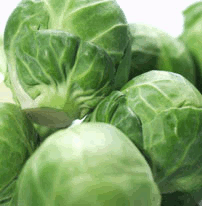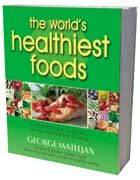


Lycopene-Potent Antioxidant Protection
The carotenoid and antioxidant lycopene, is Nature's perennial valentine, sent to the whole human race in tomatoes and other red-hued members of the World's Healthiest Foods. In numerous studies, lycopene has been found to offer significant protection against potentially life-threatening diseases, including prostate cancer, atherosclerosis, and asthma.
Lycopene's protective effects against prostate cancer were revealed when researchers at the Center for Human Nutrition, University of California at Los Angeles School of Medicine, Los Angeles, interviewed 65 male patients with prostate cancer and 132 cancer-free controls, and then evaluated their plasma levels of various antioxidants. After adjustments were made for age, race, years of education, daily caloric intake, pack-years of smoking, alcohol consumption, and family history of prostate cancer, the data showed a significant inverse association between the incidence of prostate cancer and blood levels of lycopene. Those men with the highest blood levels of lycopene were at a significantly lower risk for prostate cancer than those with the lowest levels of this protective carotenoid.
Lycopene has also been found to offer protection against the development of cardiovascular disease, as demonstrated by a research study that involved 520 middle-aged men and women in southeastern Finland. After accounting for all other factors, the researchers found low blood levels of lycopene were linked to a nearly 18% increase in intima-media thickness of the carotid artery. Since gradual thickening of the intima-media thickness of the carotid artery is a marker for the progression of atherosclerosis, low blood levels of lycopene were linked to a significantly increased risk for this cardiovascular disease.
Lycopene's potent antioxidant activity has also been shown to reduce the risk of exercise-induced asthma (EIA) in some patients. Researchers in Israel studied 20 patients with exercise-induced asthma (EIA). Patients were randomly assigned to receive a once-daily supplement of 30 mg of lycopene or an inactive placebo. After just one week, patients given lycopene had elevated blood levels of lycopene compared to the placebo group, and 55% of the patients given lycopene showed significant protection against EIA.
How can you increase your intake of lycopene? Lycopene is abundant in several of the World's Healthiest Foods. Tomatoes are one of the best sources of lycopene: 100 grams of fresh tomatoes contain between .88-4.20 mg of lycopene, but cooked tomatoes, especially when they are concentrated as they are in tomato paste, is an even better source: 100 grams of tomato paste provides between 5.40-150 mg of lycopene. And be sure to add a little olive oil-by eating lycopene-rich foods with some healthful fat, the absorption of this protective nutrient is significantly increased: 100 grams of sun-dried tomato in oil provides 46.5 mg of lycopene.
If tomatoes do not agree with you, the World's Healthiest Foods provide a variety of other lycopene-rich sources, including apricots (.86 mg of lycopene per 100 grams), pink grapefruit (3.36 mg of lycopene per 100 grams), fresh papaya (2.00-5.30 mg of lycopene per 100 grams), and watermelon (2.30-7.20 mg of lycopene per 100 grams).
For suggestions as to how to enjoy these lycopene-rich members of the World's Healthiest Foods more often, click on the Recipe Assistant, select any of these foods on the healthy foods list, and click on the Submit button. A list containing links to all the World's Healthiest Foods' recipes containing the food chosen will appear immediately below.
References:
Lu QY, Hung JC, Heber D, Go VL, Reuter VE, Cordon-Cardo C, Scher HI, Marshall JR, Zhang ZF. Inverse associations between plasma lycopene and other carotenoids and prostate cancer. Cancer Epidemiol Biomarkers Prev 2001 Jul;10(7):749-56.
Rissanen T, Voutilainen S, Nyyssonen K, Salonen R, Salonen JT. Low plasma lycopene concentration is associated with increased intima-media thickness of the carotid artery wall. Arterioscler Thromb Vasc Biol, 2000 Dec; 20(1`2):2677-81.
Neuman I, Nahum H, Ben-Amotz A. Reduction of exercise-induced asthma oxidative stress by lycopene, a natural antioxidant. Allergy 2000 Dec; 55(12):1184-9
Clinton, S.K. Lycopene: Chemistry, Biology, and Implications for human health and disease, Nutrition Review, 1998; 56(2):35-51.



